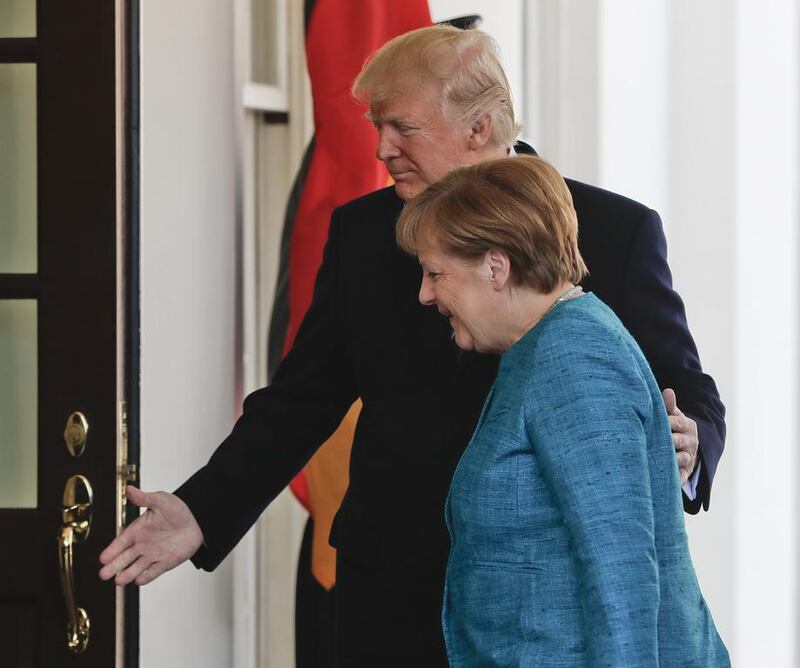WASHINGTON // US president Donald Trump welcomed the German chancellor Angela Merkel to the White House on Friday and almost immediately committed a faux pas by appearing to refuse to shake her hand.
It was their first face-to-face encounter and always had the potential for awkwardness. During his election campaign, Mr Trump repeatedly criticised the German leader for her open-door policy towards refugees and accused her of “ruining” Germany.
And he did not get off to the best of starts. Seated in armchairs for the traditional photograph, Mr Trump looked sulky and sat slumped forward with his feet apart and his hands between his knees. When photographers called out for him to shake hands with Ms Merkel, she prodded him gently, asking, “Do you want to have a handshake?” But Mr Trump either did not hear or chose to ignore the request, turning only briefly towards his guest but not moving his hands or legs. At one point the president quipped, “Send a good picture back to Germany, please.”
Ms Merkel could only smile thinly as she turned back towards the cameras.
Things appeared to have been smoothed over when they appeared for their first joint press conference. On the agenda for discussion were strengthening Nato, combating ISIL, and resolving the conflict in Ukraine – all of which require close cooperation between the United States and Germany.
Another of Mr Trump’s hobby horses on the campaign was his insistence that all members should pay their fair share to support Nato – even suggesting the US might not come to the aid of its Nato allies if other members did not pay up.
Only the US and four other members currently reach the benchmark of spending 2 per cent of GDP on defence, and Germany lags significantly behind. Mr Trump referred to the discrepancy in the press conference, saying “many nations owe vast sums of money” which was “very unfair to the United States”. The United States would respect historic institutions but other countries must pay their fair share, he said, although he thanked the chancellor “for the German government’s commitment to increase defence spending and work toward contributing at least 2 per cent of GDP” for Nato.
Ms Merkel said she and the president had exchanged views on immigration and refugees.
The chancellor has 11 years of experience as a leader and Mr Trump is her third US president, but she regards him as an unknown quantity and prepared thoroughly for their meeting, studying his speeches and policies to find areas of cooperation. She forged a strong bond with Barack Obama and his final call as president to a foreign leader was to the German chancellor.
She has brought with her to Washington a trade delegation that includes top executives of BMW and Siemens, companies which employ tens of thousands of Americans. Many live in southern states that voted for Mr Trump.
* Associated Press





